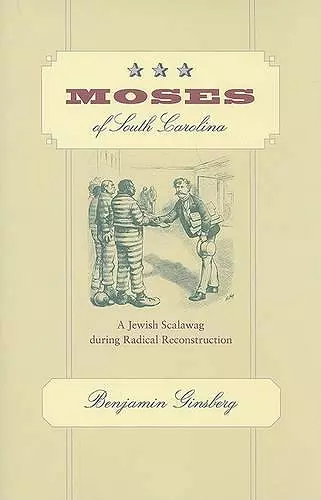Moses of South Carolina
A Jewish Scalawag during Radical Reconstruction
Format:Hardback
Publisher:Johns Hopkins University Press
Published:7th May '10
Currently unavailable, and unfortunately no date known when it will be back

Franklin Moses Jr. is one of the great forgotten figures in American history. Scion of a distinguished Jewish family in South Carolina, he was a firebrand supporter of secession and an officer in the Confederate army. Moses then reversed course. As Reconstruction governor of South Carolina, he shocked and outraged his white constituents by championing racial equality and socializing freely with former slaves. Friends denounced him, his family disowned him, and enemies ultimately drove him from his home state. In Moses of South Carolina, Benjamin Ginsberg rescues this protean figure and his fascinating story from obscurity. Though Moses was far from a saint-he was known as the "robber governor" for his corrupt ways-Ginsberg suggests that Moses nonetheless deserves better treatment in the historical record. Despite his moral lapses, Moses launched social programs, integrated state institutions, and made it possible for blacks to attend the state university. As a Jew, Moses grew up on the fringe of southern plantation society. After the Civil War, Moses envisioned a culture different from the one in which he had been raised, one that included the newly freed slaves. From the margins of southern society, Franklin Moses built America's first black-Jewish alliance, a model, argues Ginsberg, for the coalitions that would help reshape American politics in the decades to come. Revisiting the story of the South's "most perfect scalawag," Ginsberg contributes to a broader understanding of the essential role southern Jews played during the Civil War and Reconstruction.
Moses of South Carolina is a welcome and long overdue reappraisal of the firebrand governor... There is much to recommend Ginsberg's work. The author makes the Byzantine politics of the period understandable. His discussion of Moses's marginality, the politics of corruption, the economy, and land reform in the state is compelling, intriguing, and audacious. -- Edmund L. Drago Civil War Book Review 2010 Historians of Reconstruction should applaud the fact that someone has at last taken the trouble to draw scholarly attention to such an important and little-understood figure. -- Bruce E. Baker Register of the Kentucky Historical Society 2010
ISBN: 9780801894640
Dimensions: 216mm x 140mm x 21mm
Weight: 408g
240 pages